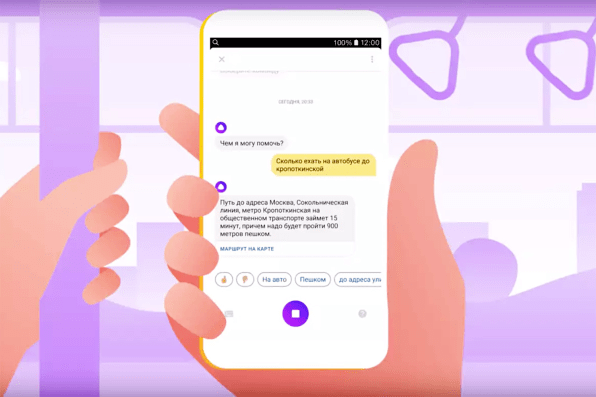Alice In Putin’s Wonderland: How Russia’s AI Assistant Compares To Siri And Alexa
By Daria Solovieva
As artificial intelligence technology gets smarter and smarter, our concerns about user privacy keep growing. We’re asking why Amazon’s Alexa is laughing at users, whether Alexa can testify against you in court, and how Apple’s Siri can read your hidden messages out loud to other users. And Facebook’s privacy issues are getting so bad, the company has put its own plans for a smart speaker on hold.
But there is an AI assistant that shows no signs of slowing down and is not encumbered by any privacy or regulatory concerns. Launched in Moscow less than six months ago, Alice now has millions of daily users and “tens of millions daily interactions” according to Mikhail Bilenko, head of Machine Intelligence and Research at Yandex, Russia’s tech giant that runs the country’s dominant search engine and ride-hailing service.
Yandex launched Alice in October 2017, touting its first AI assistant as more conversational than its English-language competitors. Alice developers relied on the voice of a Russian actress who also provided the voiceover for Scarlett Johansson’s AI character in the Spike Jonze film Her. The AI assistant can be used by any Russian speaker anywhere on the planet.
“When it comes to non-informational chitchat, none of them (AI assistants) do it currently, there are a few pre-edited responses to certain questions, but that’s it,” Bilenko says in an interview with Fast Company. “Alice has a lot of directional, informational functions like the weather and currency (inquiries), but it also allows you just to chat about how your day was. The topic can be anything.”
Whether you’d like to chat with a Russian AI assistant about your day is another issue, but Alice raises important questions about AI evolution, data privacy, and cross-border technology regulation amid the biggest rift between Russia and United States and an unprecedented series of spy and hacking scandals since the Cold War.

Facing Less Regulatory Scrutiny
To really understand the significance of Yandex, imagine if Google had deeper ties to the U.S. government. For Russia’s internet users, Yandex is the dominant search engine and its news algorithm and political coverage are subject to censorship. The Kremlin’s former economic minister Herman Gref is on the board of directors. Yandex denies any connections to Russian government.
While focused on the Russian market, Yandex has some global ambitions as well. It’s a publicly traded company (NASDAQ:YNDX) and has just launched English-language Yandex.taxi service in Latvia.
When Bilenko arrived at Yandex about a year ago after spending at decade at Microsoft, the Russian company has already been working on its AI assistant. Yandex says it has no plans to launch Alice in English.
“Adding more languages is not the main factor of growth,” Bilenko says. “We want to add more functionalities and make it more accurate, clever, have better conversations.”
Yandex says it collects data on users’ activities and preferences to “help enhance and personalize user experiences, improve products and services.” The company says it stores data across Yandex data centers and does not share data with third parties unless required by law. In either scenario, Alice faces less public and regulatory scrutiny than Amazon’s Echo or Google Home, which transmit data to third parties.
For Russian speakers using Alice service abroad, the process is the same.
“Alice improves and continues to learn from more data inputs such as search query history, search results, and other user preferences,” according to Yandex. “The vast majority of users are local, but for the Russian speakers abroad using the product, the process is the same.”
The company says the application only records the user’s voice when the user activates the microphone and does not record ambient conversations without instruction from the user.
While Yandex says it complies with regulations on user data collection in each country, these regulations vary and are lacking in many parts of the world.
“There is no regulation about storing user data of European citizens for example only in Europe. There are some propositions, but no laws,” says Sergey Petrenko, former CEO Yandex Ukraine for over eight years. He is currently serves as CEO of Terminal 42, a coworking space in Odessa, Ukraine.
“They are able to make everything they need with user data in-house–from recognizing user speech to processing the data to replying to customers,” Petrenko says.

More Creative Than Siri, Not Necessarily More Accurate
After testing Alice’s conversational abilities and responses in Dubai, Paris, and New York, the replies were more creative than replies provided by Siri, but not necessarily more conversational or accurate.
After one or two prompts, the “conversation” typically fizzles out.
TEST 1: Alice is eager to talk about books, but only to an extent.
Fast Company (in Russian): Alice, who is your favorite author?
Alice: I like Isaac Asimov. Just like Leo Tolstoy, only about robots.
Fast Company: Why do you like his books?
Alice: Difficult to explain.
Fast Company (in English): Siri, who is your favorite author?
Siri: I don’t know.
TEST 2: Alice provides more answers with user-generated responses and ratings, which are arguably more valuable. Siri promotes relevant Apple products and platforms, including user ratings and rankings, but provides less straightforward responses.
Fast Company: What are the most interesting books to read right now?
Alice: (Goes to search results, the top results are user-generated ratings of books)
Siri: (Goes straight to ibooks, provides more information but takes more time)
TEST 3: Siri provides better directional/informational responses in New York, outside of Alice’s core market.
Fast Company: Where is the nearest movie theater?
Alice: Sent me to New Jersey (AMC Menlo Park 12, 40 kilometers away)
Siri: Okay, I found 10 theaters.
OTHER EXAMPLES:
Fast Company: Do you like Jay-Z or Drake?
Alice: We ran into each other a couple of times.
Siri: This is about you, not me.
We are still in the early days of AI evolution and technology. Russian language or not, Alice’s conversational skills are still a work in progress.
Still, after several weeks of testing and talking to AI experts about Alice and its competitors, there are several takeaways.
Alice has a clear home advantage over Siri and other AI assistants in a Russian-speaking Android-dominated market: Android makes up 70% of the mobile operating systems in Russia. Outside of these markets, the jury is out whether Yandex will launch Alice in additional languages or whether it can compete directly with English-language assistants.
The Tradeoff Between Accuracy And Privacy
For the next generation of AI assistants, meaningful progress in user experience will likely involve a tradeoff between accuracy and privacy.
“The next significant move will be when assistants become proactive rather than passive–serving us information based on their understanding of habits, time, and context, says Geoff Blaber, vice president of leading mobile device software research at CCS Insight.
“This is far more complex and will be a tightrope walk to avoid concerns regarding privacy and intrusion.”
Data, and the company that successfully acquires and learns from the largest data set, will be the winner in this global AI race.
“To really succeed with AI products, you need an unimaginable amount of data, you need the broadest possible set of used cases,” says Nicco Mele, the director of the Shorenstein Center on Media, Politics and Public Policy at the Harvard Kennedy School.
Security and privacy concerns are here to stay and are only going to get worse as technology evolves.
Yandex and its AI assistant may end up having very little impact outside Russia.
“The relevance of a company’s services to consumers in a particular country has far greater importance than any political context,” Blaber says. “It’s hard to see Yandex having any significant influence with Alice outside of its home market.”
But it’s still important to pay attention how this technology will evolve.
Whether Alice technology catches on outside Russia or not, who will hold Yandex accountable on how it collects data on its users around the world? In addition to a mobile app, Alice assistant can be also used on any desktop via Yandex browser.
Some of the biggest Yandex shareholders are U.S.-based companies. Who will hold them accountable?
“At this point security is always a persistent concern,” Harvard’s Mele says. “Frankly, it’s a concern for non-Russian providers too, Facebook is not a Russian company.”
As government agencies and technology giants are busy putting out fires in the age of front-page hacks and data thefts, the biggest long-term threat to consumer privacy could come from a helpful, sweet-sounding AI assistant that is increasingly learning more about us than we are aware of.
Yandex has dismissed any security or privacy concerns.
“We have not had any complaints,” Bilenko says. “Our core market is focused on the Russian speakers, wherever they are.”
This story has been updated.
(104)



